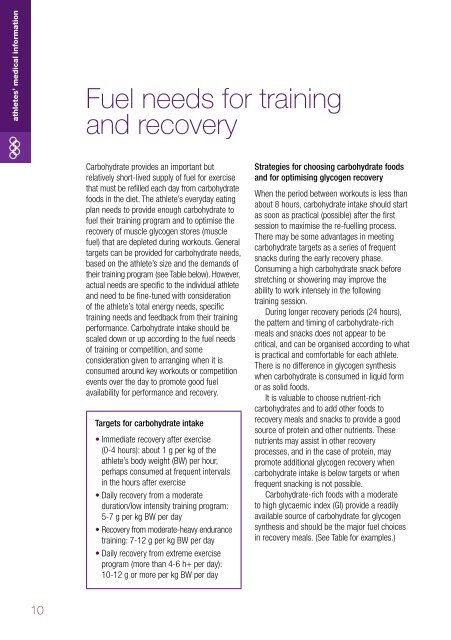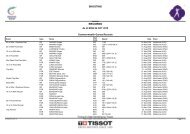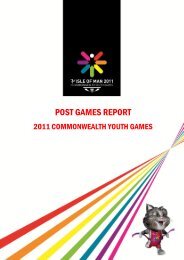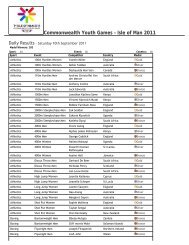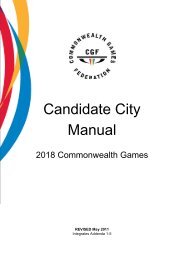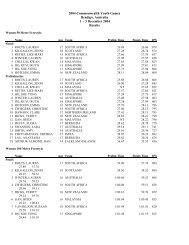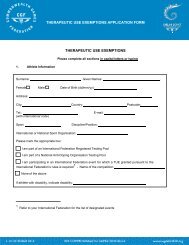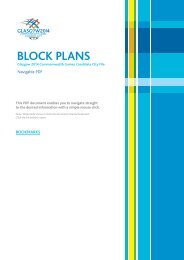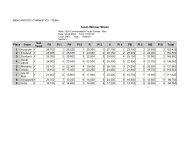Nutrition for Athletes - Commonwealth Games Federation
Nutrition for Athletes - Commonwealth Games Federation
Nutrition for Athletes - Commonwealth Games Federation
You also want an ePaper? Increase the reach of your titles
YUMPU automatically turns print PDFs into web optimized ePapers that Google loves.
athletes’ medical in<strong>for</strong>mationFuel needs <strong>for</strong> trainingand recoveryCarbohydrate provides an important butrelatively short-lived supply of fuel <strong>for</strong> exercisethat must be refilled each day from carbohydratefoods in the diet. The athlete’s everyday eatingplan needs to provide enough carbohydrate tofuel their training program and to optimise therecovery of muscle glycogen stores (musclefuel) that are depleted during workouts. Generaltargets can be provided <strong>for</strong> carbohydrate needs,based on the athlete’s size and the demands oftheir training program (see Table below). However,actual needs are specific to the individual athleteand need to be fine-tuned with considerationof the athlete’s total energy needs, specifictraining needs and feedback from their trainingper<strong>for</strong>mance. Carbohydrate intake should bescaled down or up according to the fuel needsof training or competition, and someconsideration given to arranging when it isconsumed around key workouts or competitionevents over the day to promote good fuelavailability <strong>for</strong> per<strong>for</strong>mance and recovery.Targets <strong>for</strong> carbohydrate intake• Immediate recovery after exercise(0-4 hours): about 1 g per kg of theathlete’s body weight (BW) per hour,perhaps consumed at frequent intervalsin the hours after exercise• Daily recovery from a moderateduration/low intensity training program:5-7 g per kg BW per day• Recovery from moderate-heavy endurancetraining: 7-12 g per kg BW per day• Daily recovery from extreme exerciseprogram (more than 4-6 h+ per day):10-12 g or more per kg BW per dayStrategies <strong>for</strong> choosing carbohydrate foodsand <strong>for</strong> optimising glycogen recoveryWhen the period between workouts is less thanabout 8 hours, carbohydrate intake should startas soon as practical (possible) after the firstsession to maximise the re-fuelling process.There may be some advantages in meetingcarbohydrate targets as a series of frequentsnacks during the early recovery phase.Consuming a high carbohydrate snack be<strong>for</strong>estretching or showering may improve theability to work intensely in the followingtraining session.During longer recovery periods (24 hours),the pattern and timing of carbohydrate-richmeals and snacks does not appear to becritical, and can be organised according to whatis practical and com<strong>for</strong>table <strong>for</strong> each athlete.There is no difference in glycogen synthesiswhen carbohydrate is consumed in liquid <strong>for</strong>mor as solid foods.It is valuable to choose nutrient-richcarbohydrates and to add other foods torecovery meals and snacks to provide a goodsource of protein and other nutrients. Thesenutrients may assist in other recoveryprocesses, and in the case of protein, maypromote additional glycogen recovery whencarbohydrate intake is below targets or whenfrequent snacking is not possible.Carbohydrate-rich foods with a moderateto high glycaemic index (GI) provide a readilyavailable source of carbohydrate <strong>for</strong> glycogensynthesis and should be the major fuel choicesin recovery meals. (See Table <strong>for</strong> examples.)10


